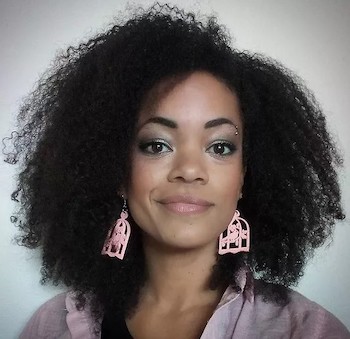DU Alumna Wins Second Emmy Award
Stephanie Filo (BA ‘06) was recognized for her role as editor on “A Black Lady Sketch Show”
Graduate student Tabea Wurst shares highlights from her conversation with Stephanie Filo (BA ’06)
DU alumna Stephanie Filo (BA ’06) earned her second Emmy win during what, thanks to COVID-19, was arguably one of the most trying times in the history of filmmaking. Her most recent Primetime Emmy recognized her editing team’s talents and efforts for their work on HBO’s “A Black Lady Sketch Show.” This win marks the first time an all-women of color editing team was nominated and won the award for Outstanding Picture Editing for Variety Programming. She won her first Emmy for her editing on “Separated,” an episode focusing on ICE deportations in the serial news documentary "Mental State." With that award, she and her co-editor Nziga Blake were the first Sierra Leonean women to ever win an Emmy.
Filo told me that her interest in storytelling started when she was a young girl growing up in Colorado. In school, she greatly enjoyed all projects involving storytelling. Watching movies convinced her that she wanted to be a part of the magic of storytelling, and that passion brought her to study journalism and political science at the University of Denver. Her experiences at DU had an impact on her later career. At DU, Filo learned about the different narrative arcs in film and familiarized herself with various editing software programs. In a documentary class at DU discussing body language, she said, she learned more than she could have imagined about non-verbal communication in cinema. Filo used this information during her work on a later documentary in a way that allowed her to cover an intense topic while also including tasteful light humor. She left DU and Colorado with a keen appreciation for the power of editing in the telling of a compelling story, and she headed to Los Angeles to pursue her dream. Once she arrived in Los Angeles, Filo took up a night editing job and loved exploring editing further, developing what is now recognized as her fantastic technique around tone & pace.
The editing field involves very time intensive and hectic work situations that are at times challenging but are also creatively satisfying, she said. Filo considers herself lucky to have worked on a variety of projects that featured Black stories being told by Black talent and stories of women being told through a female lens. Her most special memory is working on a project with three other female Black editors.
Before launching her career in film and television editing, Filo started out in Los Angeles as a professional dancer and a cheerleader. Her love for dance and music helped hone her skills as an editor, she noted, asserting that background sound is the core of any well-made film. For Filo, sound, music and pace in editing are her biggest passions. Storytelling is an art, and Filo understands that putting together a story artistically can make or break a movie. Deciding on the series’ tone is essential, but editing, for Filo, is the final rewriting of the script, something she said is a very impactful and powerful job. While she does not have a preferred genre, she likes working on meaningful stories, and noted that she has been able to edit both some lighthearted pieces, and others more emotional and heavier in tone.
In a predominantly white, male-dominated industry, Filo learned to collaborate with her peers from different backgrounds and has come to appreciate each person’s uniqueness. Her success in editing the documentary episode “Separated,” she said, has positively affected her and fueled her motivation to work on stories that she believes in and wants to tell, and she seeks to cover topics that don’t get much exposure.
Filos said that she would like the film and TV industry and medium to be more open to stories that reflect reality. She tries her best not to be typecast by the industry, and as a result she deliberately selects projects that are out of her comfort zone. Some of her upcoming projects, for instance, include “Monster” (Netflix) and “Acts of Crime” (ABC).
Filo also actively participates in social campaign efforts, working tirelessly to bring up issues that impact women worldwide. She has worked on the Obama White House Task Force’s “It’s On Us” campaign to help decrease sexual assaults on school grounds, and she also serves on the board of a social impact feminist-based organization. She is a co-founder of “End Ebola Now” and has worked on a campaign to increase awareness and spread accurate information about the Ebola Virus.
Since quarantine, Filo has been working from home, which has curtailed the interactive work environment that usually occurs in the editing bay and has meant that Filo has interacted with all her colleagues via Zoom, from the technicians to producers to, of course, the final audience. This alternative approach, she notes, did have an advantage: she was able to have instant feedback since she could observe her colleagues’ and audience members’ reactions in real-time.
Filo loves her work and enjoys the post-production process as it gives her more control and responsibility to tell an authentic story. When asked what she would recommend for students who aspire to follow in her footsteps, she said this: she feels it’s essential for upcoming editors to be persistent. Remember, she said: the project can be small but every effort will be a learning experience.



